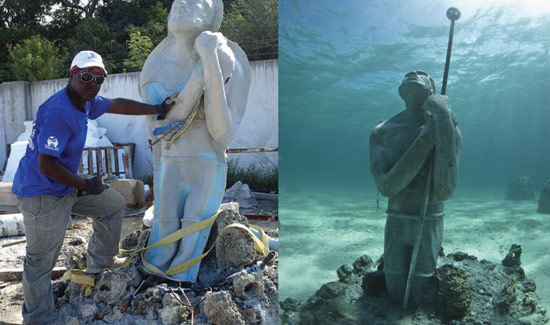
The Bahamas Petroleum Company (BPC) still has a number of “outstanding issues” that must be resolved before the Bahamian government is satisfied, according to the minister of environment.
Kenred Dorsett confirmed to Guardian Business that BPC has paid its fees and remained in compliance in a number of areas. However, he noted that there are environmental concerns on the table, most notably recommendations made by the Bahamas Environment and Science Technology (BEST) Commission.
According to the original letter sent to BPC, which has been obtained by Guardian Business, the oil explorer is required to provide detailed information on the subsurface conditions at the proposed well site.
The area in question would likely be near the Cuban border just south of Andros.
The letter also states that, until well pressure can be determined, BPC must confirm the likely and worst case scenarios in the proposed areas.
The company should also provide clarification “as to whether a vessel or platform will be utilized to drill a well and to provide information on the Sanitary and Waste Management discharge related thereto”.
“With regard to the sub-sea telecommunications along the area, the survey results and protection plan were to be included in the well specific Environmental Management Plans,” the letter concluded.
Dorsett felt the headline presented by another local daily was “misleading”, in the sense BPC should not be considered in full compliance.
“We require BPC to comply with these environment issues,” Dorsett told Guardian Business.
Another issue the Ministry of Environment wished to hammer home is the importance of a national referendum on the oil issue. Dorsett explained that everything is ultimately dependent on that decision by the people.
He said the timetable for this referendum will be determined by the Prime Minister’s Office, but it is unknown when it will take place.
“It ensures they are advised in writing as to our position regarding their licenses and the issue of compliance, and puts in writing our position on the referendum,” Dorsett told Guardian Business.
For now, Bahamians and shareholders of BPC on the London Stock Exchange (LSE) will have to sit back and wait. Yesterday’s announcement that BPC’s licences are recognized by the government failed to raise the share price. Shares fell 7.69 percent in yesterday’s trading, ending the day at 6 pence per share.
In a statement from BPC, the company said the recommendations from BEST have been noted and “already adopted into BPC’s future plans”. The oil explorer felt the letter was a testament to the company’s relationship with the government and the Bahamian people.
Based on a recent Front End Engineering Design (FEED) study, the CEO of BPC, Simon Potter, said a detailed “Well Plan” is in place. The company said it would benefit from clear input for the government in terms of environmental regulations and the mandate from the people.
“I am pleased to announce this confirmation from the government with regard to the good standing of our licenses,” Potter stated. “It is a positive step which assures the integrity of the licence area. It enables the company to schedule exploration drilling to avoid the 2013 hurricane season and also ensures sufficient time to plan and execute the safest well possible without breaching the terms of the second phase of the licence agreement.”
By: Jeffrey Todd
Business Editor
The Nassau Guardian
The Bahamas Petroleum Company (BPC) still has a number of “outstanding issues” that must be resolved before the Bahamian government is satisfied, according to the minister of environment.
Kenred Dorsett confirmed to Guardian Business that BPC has paid its fees and remained in compliance in a number of areas. However, he noted that there are environmental concerns on the table, most notably recommendations made by the Bahamas Environment and Science Technology (BEST) Commission.
According to the original letter sent to BPC, which has been obtained by Guardian Business, the oil explorer is required to provide detailed information on the subsurface conditions at the proposed well site.
The area in question would likely be near the Cuban border just south of Andros.
The letter also states that, until well pressure can be determined, BPC must confirm the likely and worst case scenarios in the proposed areas.
The company should also provide clarification “as to whether a vessel or platform will be utilized to drill a well and to provide information on the Sanitary and Waste Management discharge related thereto”.
“With regard to the sub-sea telecommunications along the area, the survey results and protection plan were to be included in the well specific Environmental Management Plans,” the letter concluded.
Dorsett felt the headline presented by another local daily was “misleading”, in the sense BPC should not be considered in full compliance.
“We require BPC to comply with these environment issues,” Dorsett told Guardian Business.
Another issue the Ministry of Environment wished to hammer home is the importance of a national referendum on the oil issue. Dorsett explained that everything is ultimately dependent on that decision by the people.
He said the timetable for this referendum will be determined by the Prime Minister’s Office, but it is unknown when it will take place.
“It ensures they are advised in writing as to our position regarding their licenses and the issue of compliance, and puts in writing our position on the referendum,” Dorsett told Guardian Business.
For now, Bahamians and shareholders of BPC on the London Stock Exchange (LSE) will have to sit back and wait. Yesterday’s announcement that BPC’s licences are recognized by the government failed to raise the share price. Shares fell 7.69 percent in yesterday’s trading, ending the day at 6 pence per share.
In a statement from BPC, the company said the recommendations from BEST have been noted and “already adopted into BPC’s future plans”. The oil explorer felt the letter was a testament to the company’s relationship with the government and the Bahamian people.
Based on a recent Front End Engineering Design (FEED) study, the CEO of BPC, Simon Potter, said a detailed “Well Plan” is in place. The company said it would benefit from clear input for the government in terms of environmental regulations and the mandate from the people.
“I am pleased to announce this confirmation from the government with regard to the good standing of our licenses,” Potter stated. “It is a positive step which assures the integrity of the licence area. It enables the company to schedule exploration drilling to avoid the 2013 hurricane season and also ensures sufficient time to plan and execute the safest well possible without breaching the terms of the second phase of the licence agreement.”



